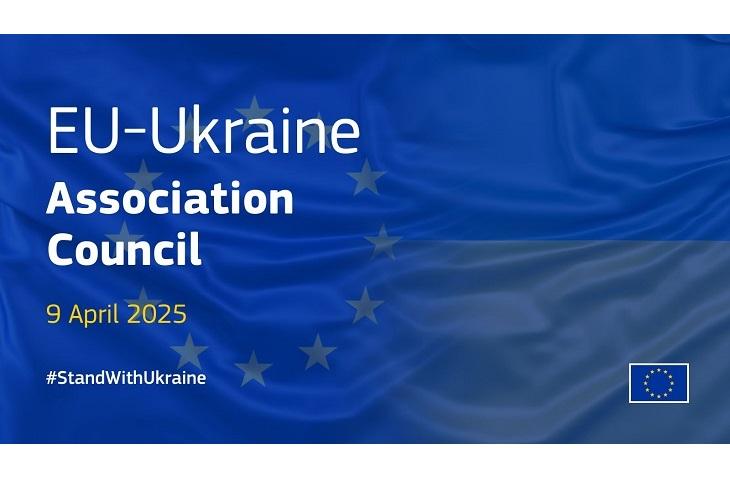
Today, Commissioner for Enlargement, Marta Kos, participated in the 10th EU-Ukraine Association Council meeting where she represented the European Commission. The meeting was chaired by the High Representative of the Union for Foreign Affairs and Security Policy and Vice-President for the European Commission, Kaja Kallas, on behalf of the EU, and Prime Minister Denys Shmyhal, on behalf of Ukraine.
The meeting focused on the implementation of the Association Agreement and the state of play of EU-Ukraine cooperation. This marked the 10th round of meetings of the EU-Ukraine Association Council since the Association Agreement entered into force in 2016. Commissioner Kos reaffirmed the EU’s steadfast support to Ukraine and welcomed key milestones achieved since the last meeting on 20 March 2024.
Support to Ukraine
During the Association Council meeting, Commissioner Kos highlighted the EU’s role as Ukraine’s largest and most stable donor, providing essential support for the country’s budget, recovery and modernisation. Since Russia’s aggression, the EU, its Member States, and European financial institutions have delivered nearly EUR 144 billion in aid, including humanitarian, economic and military assistance, as well as support for Ukrainian refugees.
Commissioner Kos stressed the importance of the Ukraine Facility, backed by the Ukraine Plan, as the key instrument for rebuilding and modernising Ukraine. Under the Ukraine Plan, the Commission has disbursed EUR 19.6 billion to Ukraine so far, with another up to EUR 9 billion set for this year, conditional on the implementation of reforms. Additionally, under the G7 Extraordinary Revenue Acceleration (ERA) initiative, EUR 5 billion in macro-financial assistance has been provided by the Commission too, with the remaining EUR 13 billion to be disbursed throughout the year, at the beginning of each month – aligning with EU Leaders’s commitment to frontload financing for Ukraine.
Strengthening Economic and Trade Ties
Commissioner Kos highlighted that, despite the ongoing war, trade between Ukraine and the EU has grown for the fourth consecutive year. In this regard, she welcomed the importance of EU-Ukraine road transport agreement and the Joint Committee’s decision on smart tachograph recognition – a step that will further enhance trade ties between the EU and Ukraine by improving transport connectivity.
Gradual integration into the EU Single Market
Commissioner Kos reaffirmed the EU’s commitment to maximise the opportunities offered by the Association Agreement to facilitate Ukraine’s gradual integration into the European Single Market, even before accession. In this regard, she welcomed progress on key initiatives, including:
- The Agreement on Conformity Assessment and Acceptance
- Granting internal market treatment for Roam-like-at-home
- Advancing Ukraine’s preparation to apply to join the geographical scope of Single Europe Payments Area (SEPA) schemes.
Administrative cooperation
Commissioner Kos welcomed progress towards the establishment of the Public Administration Reform Sub-committee under the Association Agreement, and the Joint Consultative Committee between Ukraine and the European Committee of the Regions. She emphasised that these two bodies will foster closer cooperation between the EU and Ukraine on key governance reforms, particularly in public administration and decentralisation.
Health Cooperation
On the margins of the Association Council, Commissioner Kos witnessed Ukraine signing the Joint Procurement Agreement for medical countermeasures. Since its launch a decade ago, the agreement has proven to be a crucial tool in preparing for and addressing serious cross-border health threats.
Defence and Space Cooperation
During the meeting, Commissioner Kos highlighted key steps in bringing Ukraine’s defence sector closer to the EU through initiatives such as:
- The Act in Support of Ammunition Production (ASAP)
- The opening of the EU Defence Innovation Office (EUDIO) in Kyiv last September
- Support from the European Defence Industry Reinforcement through Common Procurement Act (EDIRPA), providing Ukraine with critical defence equipment, including air and missile defence systems.
- European Defence Fund (EDF) projects, now accessible to Ukrainian companies.
Likewise, Commissioner Kos welcomed the signing of the agreement on Ukraine’s participation in the Copernicus component, the Space Weather Events and Near-Earth Object sub-components of the EU Space Programme.
Employment and Social Innovation
Additionally, she welcomed Ukraine’s expression of interest to join the Employment and Social Innovation Strand of the European Social Fund +, emphasising the ongoing efforts to facilitate Ukraine’s swift integration into the programme.
Background
The Association Council is a forum for exchanging information on European Union and Ukrainian legislative acts – both those in preparation and those already in force, and for overseeing the implementation, enforcement and compliance measures under the Association Agreement. It supervises the Agreement’s application and implementation, addresses key issues arising within its framework and any other bilateral or international issues of mutual interest, and periodically reviews its functioning in light of its objectives. It has a right to update or amend the Annexes to the Association Agreement, adopt decisions and make recommendations by agreement between the Parties.
It is composed of members of the Council of the European Union and the European Commission, alongside members of the Government of Ukraine. It convenes at ministerial level at least once a year, or as needed, in all necessary configurations, by mutual agreement. It has its own rules of procedure.
The 10th meeting of the EU-Ukraine Association Council took place on 9 April 2025.
Details
- Publication date
- 9 April 2025
- Author
- Directorate-General for Enlargement and Eastern Neighbourhood
